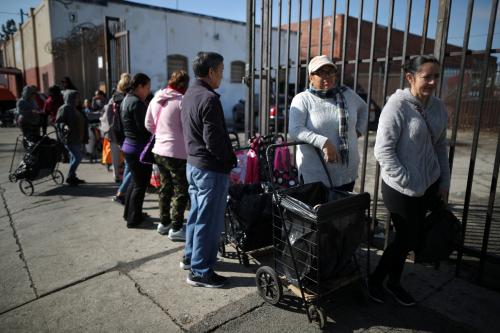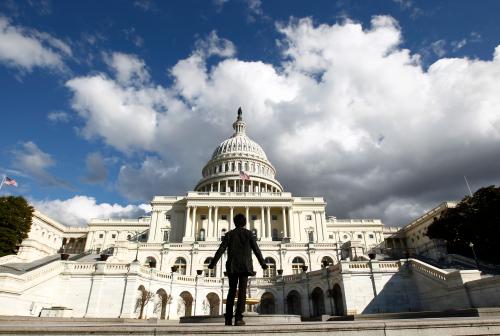A similar version of the piece was published in Democracy.
Democrats have re-taken the House, and already we’re hearing calls for investigations and greater accountability. These are fraught political times, to be sure, and I join others in demanding answers. But to the new members of the House prioritizing their long to-do lists, I’d like to offer some caution: If serving as a check on President Trump is all you manage to accomplish between now and 2020, your electoral victory may ultimately disappoint those who voted you into office, shrinking rather than growing your base and further increasing the public’s cynicism about government.
The policy message needs to be simple. It should be about jobs.
Work is a strong and unifying value in America. Work is not only what people do to earn a living but what they do because it gives them a sense of accomplishment, of contributing, and feeling like valued members of their society. We need a new social contract that says if you work you should have a shot at the American dream—the kind of training and pay package that will enable you to earn a good life. That means a private sector that treats its workers like team members by training and rewarding them in line with the profits they help to create. Instead of providing huge windfalls to corporations and the wealthy, and hoping they will trickle down to workers, let’s accomplish the same objective more directly. We can harness the private sector’s unique knowledge of skills in demand with tax incentives that encourage them to partner with community colleges to build those skills. We can fund apprenticeships. We can encourage companies to link worker pay to company performance and to share ownership with their workers. Unions used to stand up for workers; they’ve been weakened and that’s a problem. But instead of hoping we can restore the past, we need a new model of corporate responsibility energized by a revised tax law.
We need a new social contract that says if you work you should have a shot at the American dream—the kind of training and pay package that will enable you to earn a good life.
We must also recognize that most of the middle class now depends on two earners. These families face not just a money squeeze but a time squeeze. They need child care, time off for caregiving, and for lifelong learning.
In addition, we should reduce taxes, including payroll taxes, for the bottom half, thereby sending a message to working and middle class America that we have their back—that boosting their paychecks is a top priority.
By enacting a VAT or by taxing large accumulations of wealth at the very top, along with some revisions to the 2017 tax law, all of this is possible. In fact, it’s more than possible—it’s what people want.
Earlier this year, I took some policy ideas on the road, talking to middle and working-class Americans in three U.S. cities as part of a book I just completed—The Forgotten Americans. Overwhelmingly, I found Americans are most concerned with their low pay and poor benefits. They noted that there are plenty of jobs out there, and that jobs are easier than ever to find because of the Internet (and a strong economy). The problem, they insist, is that there aren’t enough good jobs. As one participant said, “I can find a job easily at McDonald’s or Taco Bell,” but “if I don’t have that schooling behind me” I can’t do better.
We must stop obsessing about the fact that slightly higher taxes on the wealthy and on corporations might reduce GDP growth by some paltry amount. They likely won’t and even if they did GDP growth is a false god in the face of a faltering democracy. Supply-side economics has been tried under three Republican presidents and it has failed. Without a robust effort to reskill America and create decently-paid jobs, we are doomed to become a second-class society where a lack of education and training makes us uncompetitive, and deindustrialization, opioids, and weak family ties destroy entire communities.
Yes, we need to address climate change, affordable health care, immigration reform, and other issues, but providing decent-paying jobs should be the top priority. In focus groups I have done with “the forgotten Americans” that’s what they say they want and that’s what it will take to restore their faith in government.






Commentary
Democrats have the House, now they need an economic agenda that gives Americans better-paying jobs
November 29, 2018